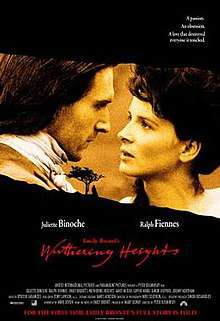Emily Brontë's Wuthering Heights
Emily Brontë's Wuthering Heights is a 1992 feature film adaptation of Emily Brontë's 1847 novel Wuthering Heights directed by Peter Kosminsky. This was Ralph Fiennes's film debut.
| Wuthering Heights | |
|---|---|
 © 1992 Paramount Pictures | |
| Directed by | Peter Kosminsky |
| Produced by | Simon Bosanquet Mary Selway Chris Thompson |
| Written by | Anne Devlin |
| Based on | Emily Brontë (book) |
| Starring | |
| Music by | Ryuichi Sakamoto |
| Cinematography | Mike Southon |
| Edited by | Tony Lawson |
| Distributed by | Paramount Pictures |
Release date | 1992 |
Running time | 105 minutes |
| Country | United Kingdom |
| Language | English |
This particular film is notable for including the oft-omitted second generation story of the children of Cathy, Hindley, and Heathcliff.[1]
Plot
The movie revolves around the lives of the Earnshaws and the Lintons. It portrays the role of suffering, revenge, and unrequited love in society.
Cast
- Ralph Fiennes as Heathcliff
- Juliette Binoche as Cathy Earnshaw Linton (and later as Cathy Earnshaw, Cathy's daughter)
- Jeremy Northam as Hindley Earnshaw
- Simon Shepherd as Edgar Linton
- Sophie Ward as Isabella Linton
- Janet McTeer as Nelly Dean
- Jason Riddington as Hareton Earnshaw
- Simon Ward as Mr. Linton
- Jennifer Daniel as Mrs. Linton
- Paul Geoffrey as Mr. Lockwood
- John Woodvine as Thomas Earnshaw
- Jonathan Firth as Linton Heathcliff
- Sinéad O'Connor as Emily Brontë
Production
Paramount Pictures was forced to use the author's name in the title of the film as Samuel Goldwyn Studio (later sold to Metro-Goldwyn-Mayer) owned the rights to the simple title Wuthering Heights due to the copyright on their 1939 film version of the novel.
The film stars Ralph Fiennes as the tortured Heathcliff and Juliette Binoche as the free-spirited Catherine Earnshaw, in a precursor to their later, successful collaboration on The English Patient.
The role of Heathcliff opened up doors for Ralph Fiennes to play Amon Goeth in Schindler's List. American director Steven Spielberg claimed he liked Fiennes for Goeth because of his "dark sexuality."
Critical response
The film received mostly negative reviews from film critics. Review aggregation website Rotten Tomatoes gives the film a score of 25% based on 8 reviews, with a rating average of 4.5 out of 10.[2]
References
- French, Philip (13 November 2011). "Wuthering Heights – review". The Observer. Retrieved 13 October 2017.
- Wuthering Heights (1992). Rotten Tomatoes. Flixter. Retrieved 27 August 2012.